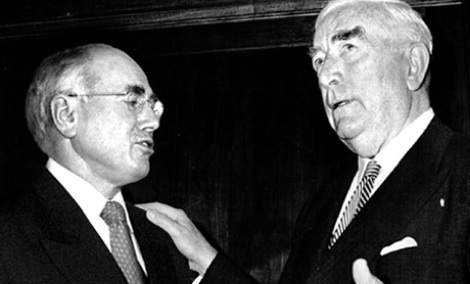It is often said the Labor Party glorifies its history, even its notable failures – and that is the only explanation that can be given for the glorification of the Whitlam Government, given it was tossed out in the biggest landslide in Australian history after only three years.

But one important anniversary in Australian politics has gone largely unnoticed. Last week was the 60th anniversary of the Robert Menzies-led Liberal Party defeating Ben Chifley’s Labor Government in 1949.
The victory of the newly formed Liberal Party over the Chifley Labor Government led to 21 years of Liberal Coalition government. And it is no overstatement to claim that this was the single most important election in Australia during the twentieth century.
I dug up both Menzies’ and Chifley’s policy speeches from 1949 and was struck by the what they had to say.
?
Chifley rattled on about the merits of central planning in manufacturing, shipbuilding, wheat production and the role of government.
Menzies on the other hand railed against the intrusion of the state into the private sphere, warning about the encroachment of socialism by stealth.
It may seem difficult to believe now, but in 1949, Australia faced the very real prospect of a dramatic shift toward a socialised economy. Ben Chifley had attempted to nationalise the banks and airlines, and there was little doubt that if re-elected Labor would seek to follow the British Labour Party’s program of socialisation of major industries across the economy.
This election was a tipping point between Australia heading down a path of a highly regulated and government-controlled economy, of housing being primarily a government responsibility versus the private-enterprise model championed by Menzies, with the aspiration of home ownership for all.
For various reasons, there is always much greater media fanfare about Labor anniversaries than Liberal ones. Maybe this is because the 1949 election ushered in an era of unprecedented economic growth, domestic peace and security – Menzies was not a radical failure like Whitlam.
If we consider only a few elements Menzies’ legacy, his contribution to modern Australia is apparent.
In foreign affairs, the cementing of the alliance with the United States; in education the dramatic expansion of university and tertiary education and the systematic funding of non-government schools for the first time; in immigration the largest and most radical transformation of Australia in our history.
The Labor Party, and particularly Paul Keating, have sought to diminish the achievements of this era. I suppose a partisan warrior like Keating must seek some explanation for the abject electoral, policy and political failure of the Labor Party for over two decades. But to do so is to dismiss the aspirations of Australians who had experienced war and depression, expressed at the polling booth for two decades.
For that generation, economic security and a commitment to cooperation with our allies against what we now know to be an international network of communism was not boring or without imagination, it was the prime responsibility of government. They knew that governments attempting to create a utopian society usually ended in tyranny or disaster. For them, the ‘light on the hill’ was job, a home and a better life for their children.
On the 60th anniversary of Menzies’ win, we should recognise the achievements of Australia’s longest-serving Prime Minister – and the socialist path he ensured Australia did not travel.